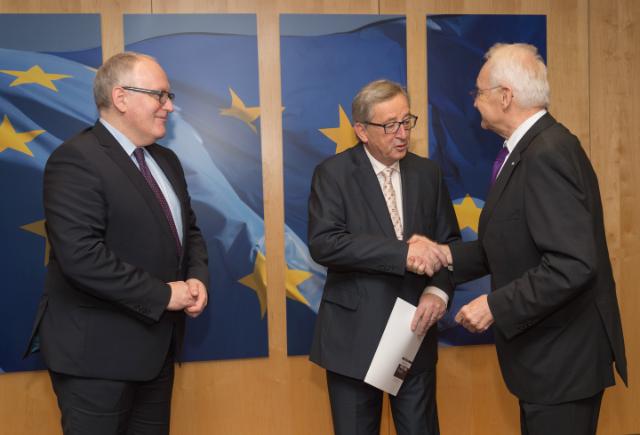
Ombudsman turns up the heat on Commission over Special Advisers
The European Ombudsman has completed her own initiative inquiry into European Commission Special Advisers by publishing a list of 10 “suggestions” for reform, especially regarding conflicts of interest assessment. Will the Commission heed her advice?
Today there are more than 40 Commission (paid and unpaid) Special Advisers who work directly with Commissioners and who are likely to have a significant degree of access and influence. The risks of conflicts of interest among this category of EU staff have been in the sights of Brussels’ ethics campaigners for quite some time, as many of them hold additional, external jobs. The ethics of Special Advisers used to be an area shrouded in secrecy and with an absence of ethics rules; but over the past ten years, Corporate Europe Observatory has exposed various problematic cases and has helped to force the Commission to improve its processes to analyse for conflicts of interest.
These cases have included former MEP Pat Cox who was a Special Adviser to Commissioner Meglena Kuneva in 2007-09 while also carrying out lobbying work for major corporations and lobby consultancies, as well as for his own lobby firm. In 2011 the Ombudsman found that the Commission had “failed to adequately examine potential conflicts of interest” in that case.
More recently, in May 2016, the present Ombudsman Emily O’Reilly called the process to appoint President Juncker’s Special Adviser on ‘better regulation’, Edmund Stoiber, “misleading” and found that it constituted maladministration, following a complaint by Friends of the Earth Europe and Corporate Europe Observatory.

Despite these rulings, ethics concerns have continued to dog some Commission Special Advisers and in December 2015, CEO submitted a further complaint to the Ombudsman detailing our concerns about the appointment of at least five other Commission advisers. Shortly after, O’Reilly announced an own initiative inquiry into the topic. Her findings, published in June 2017, do not refer to the appointment of individual advisers, but do provide a solid basis for the Commission to begin to improve its policy and practice when it comes to recruiting and retaining Special Advisers.
While O‘Reilly states that the Commission has already improved some of its practices as a result of her inquiry and civil society demands, she retains some concerns. Crucially the Ombudsman picks up on a key point emphasised in CEO’s complaint, namely that the Commission should not rely on a Special Adviser’s own judgement as to whether his or her external role creates a risk of a conflict of interest, but should instead “establish its own view” after examining all the facts. This firmly places the ball in the court of the Commission to undertake a robust assessment.
Among other important recommendations from the Ombudsman is:
“Ensure that the mitigating measures proposed in the Special Adviser’s statement of assurance are clear and specific to each individual case and provide concrete guidance to the Commissioner concerned and to the Special Adviser as to how to avoid potential conflicts of interest from arising.”
It should be obvious that, if restrictions are put in place on what a Special Adviser can do as a result of a conflict of interest assessment, they are “clear and specific”. But in too many cases, mitigating measures have been anything but clear and specific. Take, for example, the case of Jan Eric Frydman who was appointed as Special Adviser for trade policy and transatlantic affairs to Trade Commissioner Cecilia Malmström, despite the fact that at the time he was a partner in the Swedish law firm Ekenberg & Andersson, where he led the transatlantic practice. For the commissioner responsible for negotiating a major trade deal with the US (TTIP) to appoint a lawyer with transatlantic clients, seemed reckless, in our view. Frydman was simply told that there should be “no link with cases related to his activities as a lawyer”. But what does this mean and which cases are out of bounds? It was totally unclear. While CEO maintains that Frydman should not have been appointed to this role at all, if properly implemented, the Ombudsman's new recommendation should prevent similarly opaque, and arguably meaningless, restrictions on Special Advisers in the future, and should ensure mitigating measures are instead far more robust.

Another important recommendation, also germane to the case of Frydman is:
“Whenever necessary, clarify a prospective Special Adviser’s outside activities, including by asking him or her to provide further information or documents (for example, employment contracts or lists of important clients).”
If Special Advisers are simultaneously lawyers or consultants with clients and employers to whom they have obligations, it is imperative that the Commission scrutinises these specific arrangements to verify the absence of conflicts of interest. But the Commission has told the Ombudsman that its research and assessment “can only be based on publicly accessible information sources”. However lists of clients and contracts are rarely publicly available eg. in Frydman’s case, his law firm’s website contained no client list. Our view, and that of the Ombudsman, is that the Commission needs to be far more proactive in seeking and then analysing non-public, but important, sources of information.
The Ombudsman also points out the need for there to be strict procedures for Special Advisers to notify changes to their external activities; the knock-on consequence of this should surely be that the Commission reviews such new information for possible conflicts of interest. CEO discovered that former Commissioner Siim Kallas who became a Special Adviser to Commissioner Valdis Dombrovskis, did not proactively update his declaration of activities when taking on a new consultancy role and the Commission also failed to refresh its own conflict of interest assessment in the light of this new role. According to the Ombudsman, the Commission has now agreed to remind advisers every six months to keep their declaration of activities up to date.
The Ombudsman further demands greater transparency by the Commission by proactively publishing advisers’ ‘declarations of activities’ and their ‘statements of assurance’ which detail the restrictions on their role as a consequence of possible conflicts of interest. This suggestion is also important. So far, CEO has had to request such documents via access to documents and our subsequent review of these documents has sometimes exposed new possible conflicts of interest or other concerns. Such public scrutiny is essential, especially while the Commission’s own internal assessment procedures seem flawed. For example, it was only after CEO raised concerns regarding Commissioner Phil Hogan’s then adviser Miranda De Avillez and his paid work with the consultancy AGRO.GES, that the Commission revised his statement of assurance.
On a final note, the Ombudsman says that she is still looking into the issue of whether Special Advisers can simultaneously also act as members of the Commission’s Ad Hoc Ethical Committee (AHEC), which advises the Commission on ethics issues regarding commissioners. It is ALTER-EU’s contention that Special Advisers can be expected to owe a duty of loyalty to the commissioners they work for; and perhaps to the wider College too, which is incompatible with being a member of the AHEC which requires clear independence from all 28 individual commissioners.
This inquiry has certainly turned up the heat on the Commission regarding its Special Advisers. Unfortunately, the Ombudsman’s suggestions are only recommendations, and not enforceable. For the future, it is vital that the Commission approaches the risk of conflicts of interest among its Special Advisers with far more rigour, proactivity, transparency, and accountability.
